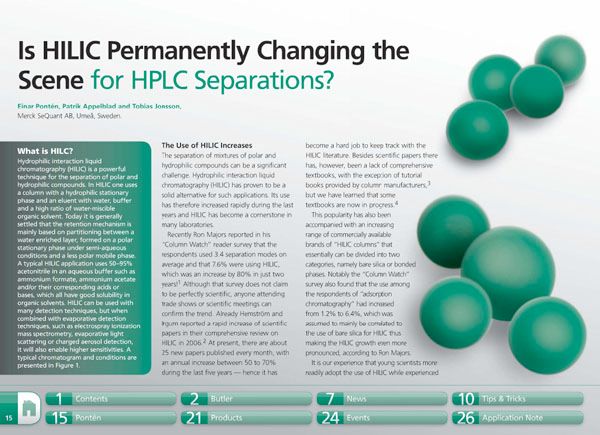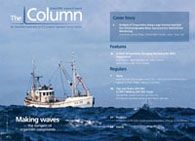Is HILIC Permanently Changing the Scene for HPLC Separations?
The separation of polar and hydrophilic compounds can be a challenge. Hydrophilic interaction liquid chromatography has proven to be a solid alternative for such applications.
Hydrophilic interaction liquid chromatography (HILIC) is a powerful technique for the separation of polar and hydrophilic compounds. In HILIC one uses a column with a hydrophilic stationary phase and an eluent with water, buffer and a high ratio of water-miscible organic solvent. Today it is generally settled that the retention mechanism is mainly based on partitioning between a water enriched layer, formed on a polar stationary phase under semi-aqueous conditions and a less polar mobile phase. A typical HILIC application uses 50–95% acetonitrile in an aqueous buffer such as ammonium formate, ammonium acetate and/or their corresponding acids or bases, which all have good solubility in organic solvents. HILIC can be used with many detection techniques, but when combined with evaporative detection techniques, such as electrospray ionization mass spectrometry, evaporative light scattering or charged aerosol detection, it will also enable higher sensitivities. A typical chromatogram and conditions are presented.
New Method Explored for the Detection of CECs in Crops Irrigated with Contaminated Water
April 30th 2025This new study presents a validated QuEChERS–LC-MS/MS method for detecting eight persistent, mobile, and toxic substances in escarole, tomatoes, and tomato leaves irrigated with contaminated water.
University of Tasmania Researchers Explore Haloacetic Acid Determiniation in Water with capLC–MS
April 29th 2025Haloacetic acid detection has become important when analyzing drinking and swimming pool water. University of Tasmania researchers have begun applying capillary liquid chromatography as a means of detecting these substances.
Prioritizing Non-Target Screening in LC–HRMS Environmental Sample Analysis
April 28th 2025When analyzing samples using liquid chromatography–high-resolution mass spectrometry, there are various ways the processes can be improved. Researchers created new methods for prioritizing these strategies.

.png&w=3840&q=75)

.png&w=3840&q=75)



.png&w=3840&q=75)



.png&w=3840&q=75)











